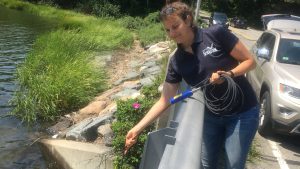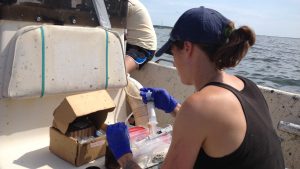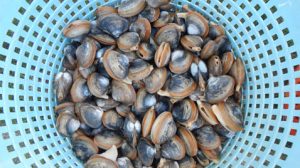Search results for: https:/seagrant.whoi.edu/wp-content/uploads/2018/06/Bering-Sea-Days-Arctic-Council-16x9.jpg
ettheme
Download a PDF of this summary
Read MoreMarine Mammal Threats
Marine Mammal Threats Background Many marine mammal populations are decreasing to critical levels largely due to human actions including; accidental capture in fishing gear (entanglement and bycatch), habitat destruction, pollution, commercial hunting, increase in ocean noise, increase in vessel traffic, and ship strikes. In addition, climate change is having an impact as prey moves, habitat…
Read MoreTeacher Workshop November 2001
Teacher Workshop November 2001 “Engineering for an Extreme Environment: Open-Ocean Moorings” Mr. Rick Trask, WHOI, Applied Ocean Physics and Engineering Department In this talk Mr. Trask, a Sr. Research Engineer, posed the problem of establishing deep moorings for instrumentation in the open ocean, and led the participants through various solutions. With demonstrations and props he…
Read MoreTeacher Workshop April 2002
Teacher Workshop April 2002 “Determining the Resistance of Marine Animals to Environmental Chemicals” Dr. Mark Hahn, WHOI, Biology Department Dr. Hahn’s major research interests include receptor-mediated mechanisms of toxicity, and means of adaptation and acquired resistance to exposure to persistent organic pollutants. This presentation centered on looking at toxins in the marine environment, particularly dioxins,…
Read MoreSea Grant Participates in First Northeast Water Quality Monitoring Blitz
More than 50 water quality monitoring groups from Long Island Sound to Downeast Maine participated in Shell Day – a water sampling “blitz” along the New England coast to capture a snapshot of coastal acidification conditions. Held August 22, 2019, this citizen science collaboration raised awareness …
Read MoreResuspension of Postlarval Soft-Shell Clams Mya arenaria through Disturbance by the Mud Snail Ilyanassa obsoleta
Resuspension of Postlarval Soft-Shell Clams Mya arenaria through Disturbance by the Mud Snail Ilyanassa obsoleta Dunn, R., L.S. Mullineaux, and S.W. Mills Marine Ecology Progress Series, Vol. 180, pp. 223-232, 1999 WHOI-R-99-010
Read MoreEigenanalysis of Recent United States Sea Levels
Eigenanalysis of Recent United States Sea Levels Aubrey, D.G. and K.O. Emery Continental Shelf Research, Vol. 2, No. 1, pp. 21-33, 1983 WHOI-R-83-007
Read MoreWHOI-R-93-011 Liu, J.T. Tidal Residual Curren
WHOI-R-93-011 Liu, J.T. Tidal Residual Curren
Read MoreUnderstanding the Waquoit Bay Ecosystem
A Q&A with Sarah Foster Sarah Foster is a Boston University graduate student doing her dissertation research in Waquoit Bay (Cape Cod, Massachusetts). A biogeochemist, Sarah investigates the impact hypoxia, or low oxygen, in the water has on crucial functions within Waquoit Bay’s ecosystem. She recently published research she and her co-author, Wally Fulweiler conducted in…
Read MoreBay State Aquaculture Projects Get Green Light from National Sea Grant Program
Two new grants to the Woods Hole Sea Grant program totaling more than $650,000 will support research aimed at expanding aquaculture production in Massachusetts. The projects won funding as part of a national strategic investment in aquaculture by the NOAA Sea Grant Program. “The United States is one of the world’s leading seafood consumers, yet…
Read More


